中考英语状元笔记及知识点集
中考状元学霸笔记1

一、单词(1)both[bəʊθ]adj.两者的pron.两者都both A and B+are…A和B都…(2)large[lɑ:dʒ]adj.大的(3)habit[ˈhæbɪt]n.习惯(4)remember[rɪˈmembə(r)]v.记得remember to do记得去做某事remember doing记得做过某事(5)place[pleɪs]n.地方;v.放置【深度拓展】常见的名词作动词:1.head n.头;v.前往2.hand n.手;v.递、给hand in上交hand out分发3.face n.脸;v.面对4.should n.肩膀v.肩负5.voice n.嗓音v.表达(6)noisy[ˈnɔɪzi]adj.吵闹的1.noise n.噪音make a noise制造噪音2.noise n.噪音voice n.嗓音sound n.声音(7)begin[bɪˈɡɪn]v.开始beginning n.开始at the beginning在一开始(8)forget[fə(r)ˈɡet]v.忘记1.forget to do sth.忘记去做某事(没做)forget doing sth.忘记做过某事(做了)2.反义词:remember v.记得remember to do sth.记得去做某事(还没做)remember doing sth.记得做过某事(做了)【深度拓展】1.unforgettable adj.难以忘记的(9)important[ɪmˈpɔː(r)t(ə)nt]adj.重要的【常规拓展】初一上学期必备句型:It’s important for sb.to do sth.:对于某人来说做某事很重要。
对于我们来说早睡很重要。
It’s important for us to go to bed early.【常规拓展】It’s important for sb.to develop a good habit of doing sth.1.对于我们来说,养成吃健康食物的习惯很重要。
中考状元学霸笔记3
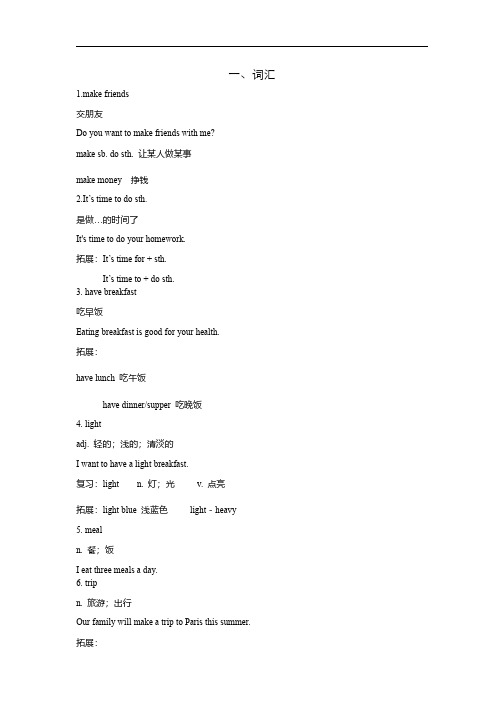
一、词汇1.make friends交朋友Do you want to make friends with me?make sb.do sth.让某人做某事make money挣钱2.It’s time to do sth.是做…的时间了It's time to do your homework.拓展:It’s time for+sth.It’s time to+do sth.3.have breakfast吃早饭Eating breakfast is good for your health.拓展:have lunch吃午饭have dinner/supper吃晚饭4.lightadj.轻的;浅的;清淡的I want to have a light breakfast.复习:light n.灯;光v.点亮拓展:light blue浅蓝色light-heavy5.mealn.餐;饭I eat three meals a day.6.tripn.旅游;出行Our family will make a trip to Paris this summer.拓展:make a trip to…去…旅行travel to…去…旅行7.differentadj.不同的I have different pencils.拓展:difference不同点be different from…与…不同the same as与…相同8.earthn.地球;泥土;陆地The earth is our home.拓展:on the earth在地球上on earth究竟9.difficultadj.困难的This question is difficult.拓展:difficulty n.困难easy简单的hard困难的10.keepv.保持;保存;坚持It’s important to keep healthy.拓展:keep the book保存书keep a pet养宠物keep running坚持跑步11.旅游;出行落实②different不同的地球;泥土;陆地earthdifficult困难的keep保持;保存;坚持11.simplyadv.简单地;仅仅She is simply a little girl.拓展:simple adj.简单的12.cornern.拐角;角落It is standing in the corner. 13.freeadj.免费的;自由的;空闲的I am free like a bird now.buy one get one free买一送一拓展:freedom n.自由14.be popular with受…的欢迎Jay Chou is popular with Chinese.15.solvesolve the problemv.解决;解答I want to solve all your problems.简单地;仅仅落实③corner角落免费的;自由的;空闲的freebe popular with受…的欢迎solve解决16.realizev.意识到;实现My mother realized her mistake.拓展:realize my dream实现我的梦想17.reviewv.复习n.复习;评论It’s time to review my lessons.17.review【re-前缀再一次】rewrite重写respell重拼recycle循环return返回18.pointv.指,点n.得分;要点You didn't get my point.拓展:point out指出19.mentionv./n.提到;说起Don't mention it.谐音:门神—过春节时我们会“提及“各种神仙,20.discussv.商量;讨论Let's discuss it.拓展:discuss=talk aboutdiscussion n.讨论20.discussdiscussion n.讨论二、语法连词板块的重点在于常考连词的意思和连词前后的逻辑关系1.and和;并且。
中考状元学霸笔记6
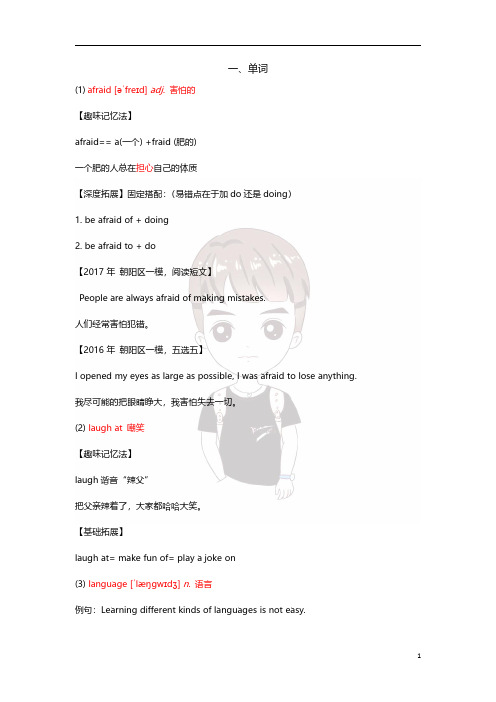
一、单词(1)afraid[əˈfreɪd]adj.害怕的【趣味记忆法】afraid==a(一个)+fraid(肥的)一个肥的人总在担心自己的体质【深度拓展】固定搭配:(易错点在于加do还是doing)1.be afraid of+doing2.be afraid to+do【2017年朝阳区一模,阅读短文】People are always afraid of making mistakes.人们经常害怕犯错。
【2016年朝阳区一模,五选五】I opened my eyes as large as possible,I was afraid to lose anything.我尽可能的把眼睛睁大,我害怕失去一切。
(2)laugh at嘲笑【趣味记忆法】laugh谐音“辣父”把父亲辣着了,大家都哈哈大笑。
【基础拓展】laugh at=make fun of=play a joke on(3)language[ˈlæŋɡwɪdʒ]n.语言例句:Learning different kinds of languages is not easy.【基础拓展】foreign language外语native/mother tongue/language母语(4)come out出来,出版【趣味记忆法】come来+out外面=come out出来;出版【深度拓展】come down下来,落e.g.Please come down to the floor.请下到地面上来。
come into(wide)use开始;被(广泛)使用e.g.Now computers has come into wide use in many fields.现在计算机已经被广泛应用于各个领域。
Come on!(表示激励)加油!快!come ture实现come up to来到……面前e.g.The guard comes up to me with smile.门卫笑着走到我面前。
中考状元学霸笔记2
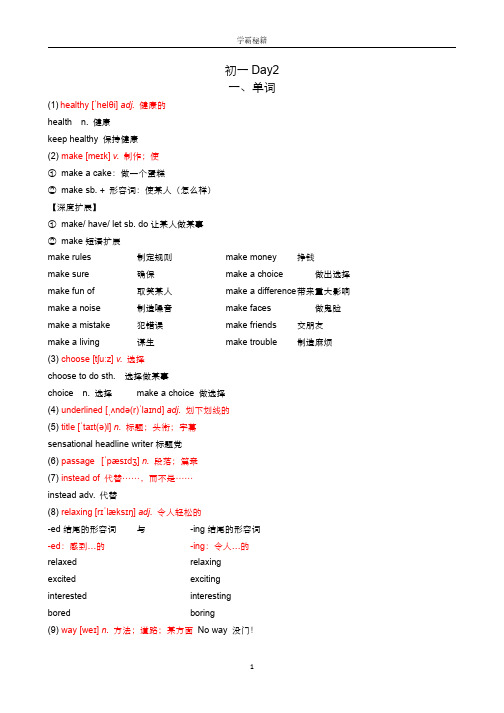
初一Day2一、单词(1)healthy[ˈhelθi]adj.健康的health n.健康keep healthy保持健康(2)make[meɪk]v.制作;使①make a cake:做一个蛋糕②make sb.+形容词:使某人(怎么样)【深度扩展】①make/have/let sb.do让某人做某事②make短语扩展make rules制定规则make money挣钱make sure确保make a choice做出选择make fun of取笑某人make a difference带来重大影响make a noise制造噪音make faces做鬼脸make a mistake犯错误make friends交朋友make a living谋生make trouble制造麻烦(3)choose[tʃuːz]v.选择choose to do sth.选择做某事choice n.选择make a choice做选择(4)underlined[ˌʌndə(r)ˈlaɪnd]adj.划下划线的(5)title[ˈtaɪt(ə)l]n.标题;头衔;字幕sensational headline writer标题党(6)passage[ˈpæsɪdʒ]n.段落;篇章(7)instead of代替……,而不是……instead adv.代替(8)relaxing[rɪˈlæksɪŋ]adj.令人轻松的-ed结尾的形容词与-ing结尾的形容词-ed:感到…的-ing:令人…的relaxed relaxingexcited excitinginterested interestingbored boring(9)way[weɪ]n.方法;道路;某方面No way没门!the way to…到…的路by the way顺便说一下【作文拓展】in this way用这种方法It’s a good way to do…这是一个做…的好方法1.这是一个保持健康的好方法。
中考状元学霸笔记7
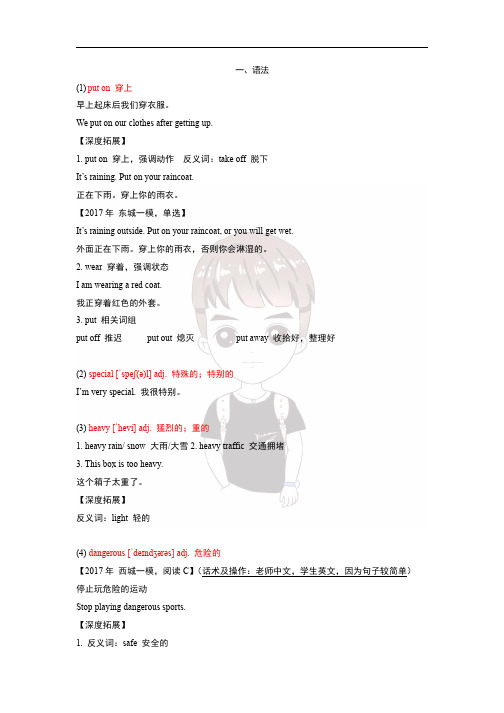
四、There be 句型的一般将来时 There be 句型的一般将来时表达: 结构 1:There will be + 其他 结构 2:There is/are going to be + 其他
A. have
B. has
C. will have
D. had
E. be
F. is
注意:3. there be 中的 be 动词变化,要看后面的名词
4. There ______ a flower and some books on the table.
A. have
B. has
C. will have
【深度拓展】 act v.表演,活动 active adj. 活跃的 –ive adj. adj. 后缀
(17) festival [ˈfestɪv(ə)l] n. 节日
Spring Festival 春节 traditional festival 传统节日
(18) send [send] v. 寄;发送;派遣
(8) rest [rest] n. 剩余部分;休息 v. 休息 1. have a rest=take a rest 休息一下 2. the rest of 剩余的…… Some students were back home, the rest of students did their homework in school. 一些学生回家了,剩余的学生在学校做作业。
I have a house. 房子里有很多头猪。 There are many pigs in the house.
have:某人有某物 there be: 某地有某人或某物
二、there be 和 have 的区别
中考复习:中考英语状元笔记-重点语法词法梳理
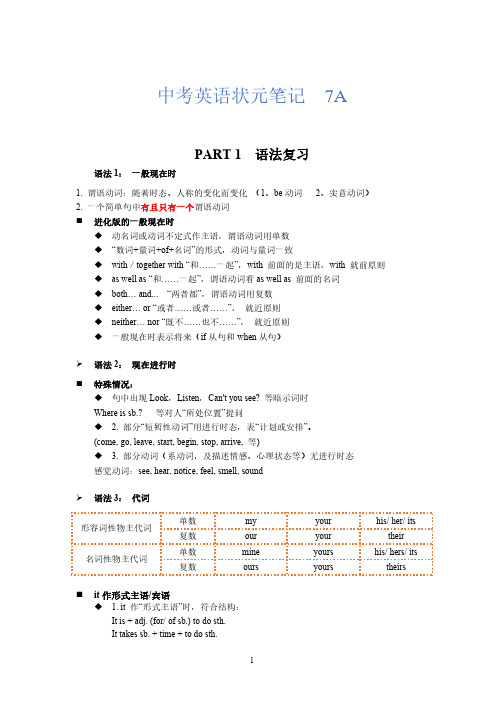
中考英语状元笔记7APART1语法复习语法1:一般现在时1.谓语动词:随着时态、人称的变化而变化(1、be动词2、实意动词)2.一个简单句中有且只有一个谓语动词⏹进化版的一般现在时◆动名词或动词不定式作主语,谓语动词用单数◆“数词+量词+of+名词”的形式,动词与量词一致◆with/together with“和……一起”,with前面的是主语,with就前原则◆as well as“和……一起”,谓语动词看as well as前面的名词◆both…and...“两者都”,谓语动词用复数◆either…or“或者……或者……”,就近原则◆neither…nor“既不……也不……”,就近原则◆一般现在时表示将来(if从句和when从句)语法2:现在进行时⏹特殊情况:◆句中出现Look,Listen,Can't you see?等暗示词时Where is sb.?等对人“所处位置”提问◆ 2.部分“短暂性动词”用进行时态,表“计划或安排”。
(come,go,leave,start,begin,stop,arrive,等)◆ 3.部分动词(系动词,及描述情感、心理状态等)无进行时态感觉动词:see,hear,notice,feel,smell,sound语法3:代词形容词性物主代词单数my your his/her/its 复数our your their名词性物主代词单数mine yours his/hers/its 复数ours yours theirs⏹it作形式主语/宾语◆ 1.it作“形式主语”时,符合结构:It is+adj.(for/of sb.)to do sth.It takes sb.+time+to do sth.◆ 2.it作“形式宾语”时,符合结构:sb.find it+adj.to do sth.语法4:特殊疑问词1.疑问代词:l指人:who, whoml指物:whatl既可指人又可指物:which, whose2.疑问副词:when, where, how, why3.特殊疑问词作主语,不确定数量时,谓语动词用单数How about=What about...怎么样...?How often多久一次(询问频率)回答:four times a year;always...How soon还有多久(短期)回答:in+一段时间How many/much多少(可数名词/不可数名词)How long多长时间回答:(for)+一段时间How far距离多远回答:ten miles/3kilometers(具体的距离)ten minutes’walk/five minutes’by bus语法5:名词⏹可数名词---复合名词复数变化两个名词构成:boy friends;paper bags(前不变后变)◆man或woman修饰:women doctors,men waiters(涉及到man/woman来修饰名词,需要两个名词同时变复数)⏹2、名词---修饰词◆只修饰单数名词---冠词:an/a;the◆只修饰复数名词—修饰词:few,a few/many,several/a great number of◆只修饰不可数名词:little,a little,much,a great amount of注:可同时修饰可数名词&不可数名词:some,any,a lot of=lots of,more,most,enough,plenty ofPART2词法复习1.形容词&副词✓ 1.系表结构(be+adj.\感官动词+adj.)感官动词:look,hear,smell,taste,feel✓ 2.频率副词:always,often,sometimes,seldom,hardly,never 2.[辨析]wear,put on,in,dress和have on✓wear意为“穿,戴”,强调状态。
中考英语状元笔记及知识点集
初一年级(上)★初一年级(下)★【知识梳理】I.重点短语1.Sit down2.on duty3.in English4.have a seat5.at home6.look like7.look atII.重要句型1.help sb. do sth.2.What about…?3.Let’s do sth.4.It’s time to do sth.5.It’s time for…e on10.at work11.at school12.put on13.look after14.get up15.go shoppingI.重点短语1.a bottle of2.a little3.a lot (of)4.all day5.be from6.be overe backe from9.get down10.go shopping11.have a drink of12.would like27. throw it like that 28. do one’s homework 29. in the middle of the day 30. in the morning / afternoon/ evening II. 重要句型 1. Let sb. do sth. 2. Could sb. do sth.? 3. would like sth. 4. would like to do sth. 5. What about something to eat?6. How do you spell …?7. May I borrow…? III. 交际用语 1. —Thanks very much! —You're welcome. 2. Put it/them away. 3. What's wrong? 4. I think so. I don't think so. 5. I want to take some books to the classroom. 6. Give me a bottle of orange juice,please. 7. What's your favourite sport?8. Don't worry.9. I ’m (not) good at basketball. 10. Do you want a go? 11. That's right./ That‘s all right./ All right.12. Do you have a dictionary / any dictionaries?Yes, I do. / No, I don’t. 13. We / They have some CDs. We / They don’t have any CDs. 14. ---What day is it today / tomorrow? ---It’s Monday. 15. ---May I borrow your colour pens, please?---Certainly. Here you are.16. ---Where are you from? ---From Beijing.17. P lease give it / them back tomorrow. OK. 18. ---Where are you from? ---From Beijing. 19. What's your telephone number in New York? 20. ---Do you like hot dogs? ---Yes, I do. ( A little. / A lot. / Very much.) ---No, I don't. ( I don't like them at all.) 21. ---What does your mother like? ---She likes dumplings and vegetables that 常常用来指在时间、地点上离讲话人更远一点的人和事,those 是 that 的复数形式。
【英语】中考英语语法状元笔记-易错点总结
目录Part1: 词法morphology 第五章:形形色色-形容词和副词第六章:引以为“介”-介词第七章:承上启下-连词第八章: 动静有常-动词第九章:情有独钟-情态动词第十章:时不我待-时态第十一章:反客为主-被动语态第十二章:似是而非-非谓语动词Part2: 句法syntax第一章:认知世界-名词第二章:避免重复-代词第三章:不计其数-数词第四章:张冠李戴-冠词第十三章:句子成分,句子种类与简单句第十四章:复杂多变-复合句第十五章:客随主便-主谓一致第十六章:直接引语和间接引语第十七章:特别关注-特殊句型第一章:名词易错点1:以y 结尾的可数名词变复数的规则以“辅音字母+y”结尾的名词,大多数变y 为i,再加-es,初中阶段常见的有:baby, city, factory;以“元音字母+ y”结尾的名词直接加-s,初中阶段常见的有:boy, day, toy 等。
以y 结尾的可数名词在变为复数形式时,对词尾y 的处理,是同学们容易混淆的地方。
易错点2:以o 结尾的可数名词变复数的规则以字母o 结尾的可数名词变复数可以分为以下两种情况,所以做题时应该注意观察字母o 前是元音字母还是辅音字母,避免出错。
(1)以“元音字母+o”结尾的的名词或以o 结尾的外来词(photo, piano 等),一般加-s。
我们可以用串珠法把以o 结尾的加-s 的名词串联为一句话:墙上有一幅照片(photo),照片里面是一个动物园(zoo),动物园里养着一只六公斤(kilo)的小袋鼠(kangaroo),袋鼠正在听收音机(radio),收音机里正播放着钢琴(piano)曲。
(2)以“辅音字母+o”结尾的名词变复数,一般加-es。
加-es 变复数的名词可以巧计为:黑人(negro)英雄(hero)爱吃西红柿(tomato)和土豆(potato)。
易错点3:表示“某国人”的名词变复数Chinese“中国人”,Japanese“日本人”,Swiss“瑞士人”等名词的单复数形式相同;Englishman“英国人”,Frenchman“法国人”的复数形式是把字母 a 变为字母e;American“美国人”,Australia“澳大利亚人”,Canadian“加拿大人”,German“德国人”等在词尾加-s。
- 1、下载文档前请自行甄别文档内容的完整性,平台不提供额外的编辑、内容补充、找答案等附加服务。
- 2、"仅部分预览"的文档,不可在线预览部分如存在完整性等问题,可反馈申请退款(可完整预览的文档不适用该条件!)。
- 3、如文档侵犯您的权益,请联系客服反馈,我们会尽快为您处理(人工客服工作时间:9:00-18:30)。
初一年级(上)★初一年级(下)★【知识梳理】I. 重点短语1.Sit down2.on duty3.in English4.have a seat5.at home6.look like7.look atII.重要句型1.help sb. do sth.2.What about…?3.Let’s do sth.4.It’s time to do sth.5.It’s time for…8.have a looke on10.at work11.at school12.put on13.look after14.get up15.go shopping【知识梳理】I. 重点短语1.a bottle of2.a little3.a lot (of)4.all day5.be from6.be overe backe from9.get down10.go shopping11.have a drink of12.would like13.get home14.get to15.get up16.have lunch17.have supper18.listen to19.not…at all20.put…away21.take off22.on a farm23.in a factory24.have a look25.have breakfast26.do the shopping6.What’s…? It is…/It’s…7.Where is…?It’s….8.How old are you? I’m….9.What class are you in? I’m in….10.Welcome to….11.What’s …plus…?It’s….12.I think…13.Who’s this? This is….14.What can you see?I can see….15.There is (are) ….16.What colour is it (are they)? It’s (They’re)…17.Whose …is this?It’s….18.What time is it? It’s….III.交际用语1.Good morning, Miss/Mr….2.Hello! Hi!3.Nice to meet you. Nice to meet you, too.4.How are you? I’m fine, thank you/thanks. And you?5.See you. See you later.6.Thank you! You’re welcome.7.Goodbye! Bye!8.What’s your name? My name is….9.Here you are. This way, please.10.Who’s on duty today?11.Let’s do.12.Let me see.IV.重要语法1. 动词be 的用法;2. 人称代词和物主代词的用法;3. 名词的单复数和所有格的用法;4. 冠词的基本用法;5. There be 句型的用法。
【名师讲解】表示在某There is a bird in the tree. 树上有只鸟。
There is a picture on the wall. 墙上有张图。
27.throw it like that28.do one’s homework29.in the middle of the day30.in the morning / afternoon/ eveningII.重要句型1.Let sb. do sth.2.Could sb. do sth.?3.would like sth.4.would like to do sth.5.What about something to eat?6.How do you spell …?7.May I borrow…?III.交际用语1.—Thanks very much!—You're welcome.2.Put it/them away.3.What's wrong?4.I think so. I don't think so.5.I want to take some books to the classroom.6.Give me a bottle of orange juice,please.7.What's your favourite sport?8.Don't worry.9.I’m (not) good at basketball.10.Do you want a go?11.That's right./ That‘s all right./ All right.12.Do you have a dictionary / any dictionaries?Yes, I do. / No, I don’t.13.We / They have some CDs.We / They don’t have any CDs.14.---What day is it today / tomorrow?---It’s Monday.15.---May I borrow your colour pens, please?---Certainly. Here you are.16.---Where are you from?---From Beijing.17.P lease give it / them back tomorrow. OK.18.---Where are you from?---From Beijing.19.What's your telephone number in New York?20.---Do you like hot dogs?---Yes, I do. ( A little. / A lot. / Very much.)---No, I don't. ( I don't like them at all.)21.---What does your mother like?---She likes dumplings and vegetablesLook! The children are playing computergames. 瞧!孩子们在玩电脑游戏。
Look!What can you see in the picture? 你能在图上 看到什么?Yesterday we watched a football match on TV 昨. 天我们从电视上看了一场足球比赛。
4. put on/ / input on 意为“穿上,戴上”。
主要指“穿上”这一 动作, 后面接表示服装、鞋帽的名词。
in 是介词,表示“穿着”,强调状态。
在句中 可以做定语、标语和状语。
如:It’s cold outside, put on your coat. 外面冷,穿 上你的外衣。
He puts on his hat and goes out. 他戴上帽子, 走了出去。
The woman in a white blouse is John’s mother.穿白色衬衣的穿白色衬衣的是 John 的妈妈。
Please come to my house this afternoon. 今天下午请到我家来。
He is not at home. 他不在家。
My family all get up early. 我们全家都起得 很早。
6. fine, nice, good, well 四者都可用作形容词表示"好"之意,但前三者 既可作表语又可作定语,而后者仅用作表语。
主要区别在于:17.short for18.a waste of time19.go fishing20.I agree21.next week22.have a picnic23.hurry up24.get together25.by the way26.all the timeII.重要句型1.have fun doing sth.2.Why don’t you…?3.We’re going to do sth.4.start with sth.5.Why not…?6.Are you going to…?7.be friendly to sb.8.You’d better do sth.9.ask sb. for sth.10.say goodbye to sb.11.Good luck(with sb)! III.交际用语31.in town32.all the same33.in front of34.next to35.up and down36.just now37.keep healthy38.grow up39.at firstst Saturday1.W elcome backto school!2.E xcuse me. I’m sorry I’m late, because the traffic is bad.3.I t doesn’t matter.4.Happy Teachers’ Day !5.That’s a good idea.6.W hat are you going to do?7.W here are we going ?8.What are we going to do ?9.I’m good at…10.I t’s not far from…11.Are you free tomorrow evening?12.Would you and Lily like to come over to my home for Mid-Autumn Festival?13.I’m glad you can come.14.Thanks for asking us.15.How about another one?16.May I have a taste?17.Let me walk with you.18.What do you have to do?19.Do you live on a farm?20.W hich do you like better, the city or the country?21.W hich do you like best, dogs, cats or chickens?22.S hall we go at ten? Good idea!23.---Let’s make it half past one. ---OK.24.---Why not come a little earlier? ---All right.25.It’s over there on the right.26.Excuse me. Where’s the nearest post office, please?27.I’m sorry I don’t know.28.You’d better…29.Thank you all the same.30.Which bus do I take?31.Go along this road.32.What day was it yesterday?33.I’m sorry to hear that.34.I hope you’re better now.35.Why did you call me?36.I called to tell…【名师讲解】could 可代替can表示现在时间的动作,但语气较为婉转。
